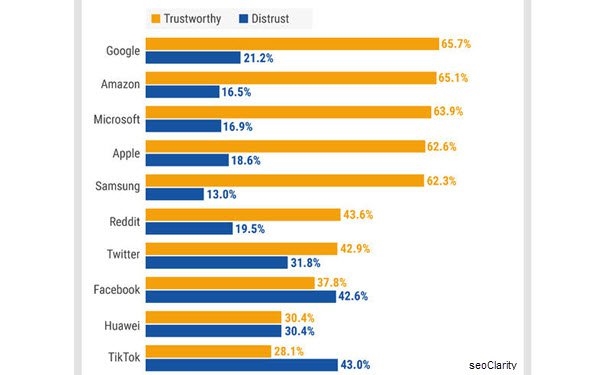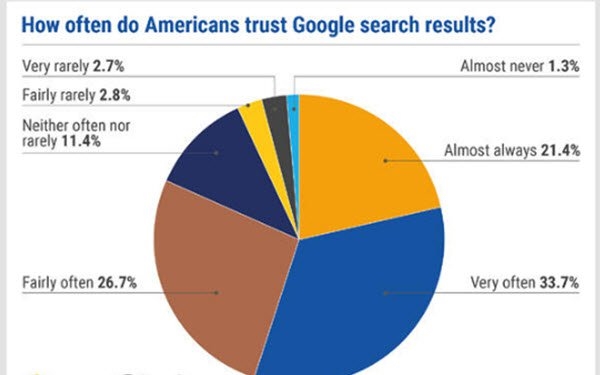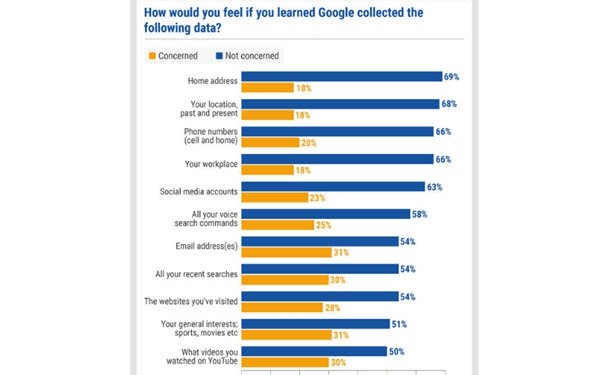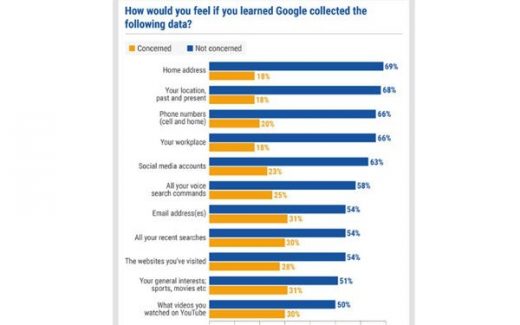TikTok, Facebook Are America’s Least-Trusted Platforms, 61% Want Tech Giants Regulated
TikTok, Facebook Are America’s Least-Trusted Platforms, 61% Want Tech Giants Regulated

When it comes to tech giants, only TikTok is less trusted by Americans than Facebook, according to new research from seoClarity, an AI-driven SEO and content optimization platform.
TikTok barely edged out Facebook, with 43% and 42.6%, respectively, expressing distrust of those social platforms.
The representative survey of 1,057 Americans 18 and older, conducted in November, probed attitudes and beliefs about the tech giants.
Facebook was deemed “trustworthy” by 37.8%, versus 28.1% saying the same about TikTok.
Conversely, Google and Amazon are ranked most trustworthy, at 65.7% and 65.1%, respectively — closely followed by Microsoft, Apple and Samsung.
However, Samsung is least distrusted (13%), followed by Amazon (16.5%), Microsoft (16.9%), Apple (18.6%) and Google (21.2%).
Google’s Ad Transparency Questioned
In addition to ranking Google as most trusted, in a separate question, 61% said they think the search engine is “fair” in its advertising practices. Yet, nearly a third (28.9%) said they don’t think Google is clear and transparent in how it displays ads.
Nearly 82% (combined) said they very often, fairly often or almost always trust Google search results, with just 7% overall saying they don’t trust them. Those over 60 were twice as likely to mistrust the results, however (14.8%).

Respondents also clearly have some misconceptions about searches.
For instance, half believe websites have total control over where their sites appear in Google searches. And asked which factors most influence a site’s ranking in a Google search, 68% said “bright colors” on the screen has a least some impact, and nearly two in five said they don’t think previous searches have much impact. Fully 61% have the incorrect impression that Google actively works with medical professionals to screen content in producing results for medical questions (as opposed to doing some prioritization of results based on sources’ known credibility).
The top three influence factors cited were relevancy of the page (51%), security of the site (43%), and date the page was last updated (26%).
Asked how they would feel if they learned Google collected various types of personal data, 69% expressed some concern about some data. However, the majority checked “not concerned” on most data elements. The only elements that provoked concern by close to a third were “your general interests (sports, movies etc.),” email addresses, all recent searches, and videos watched on YouTube.

61% Want More Regulation, 73% Fact Checking
Already nervous platforms won’t like this result: Nearly 62% of Americans believe that social media and search companies should have more regulations imposed on them. Another 25% are neutral on the issue, and just 13% disagree.
This appears to be a bipartisan view, with 63% of both Democrats and Republicans agreeing. Most of all ages also agree: 59.7% of those between 25 and 40, as well as 70% of those over 60.
Among those who favor more regulation, 35% would favor a new, independent regulatory body, 32% an industry-run self-regulation body, 21% politicians, and 12% a body of civil servants.
In addition, fewer than half overall believe that platform companies are paying their fair share of taxes. A third or more say that Facebook (36.4%), Twitter (35.8%), Apple (35.2%), Amazon (34.9%) and Microsoft (32.6%) aren’t paying enough, and 29.5% say the same about Google.
Americans also heavily favor content intervention by the social and search platforms, with 72.5% saying they should be responsible for fact-checking, and 66.7% say they should state when content is “fake news.”
Respondents were more or less split on whether U.S. politicians have done enough to protect users online (44% say no, 40% yes, with 16% unsure).
(20)


